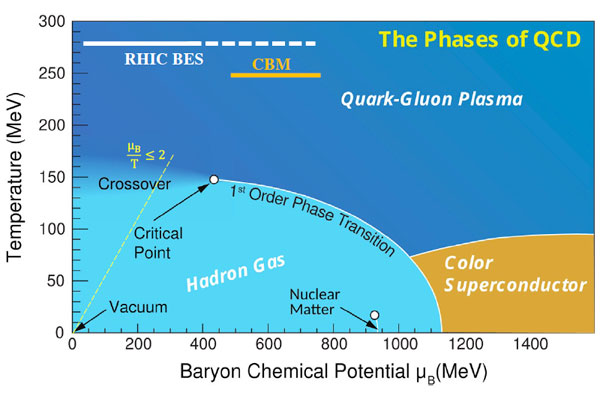Nu Xu, a senior scientist in Berkeley Lab’s Nuclear Science Division (NSD), has received a prestigious 2022 Humboldt Research Award. Xu plans to use this opportunity to spend time in Germany collaborating with colleagues there studying the QCD properties of nuclear matter.
Xu’s research in NSD’s Relativistic Nuclear Collisions (RNC) Program focuses on Quantum Chromodynamics (QCD), and in particular on locating the “QCD critical point” in high-energy nuclear collisions. Excited nuclear matter contains unique phase boundaries, similar to the phase boundaries in water that define its behavior in different states (solid, liquid, gas, plasma). Recent research has reported progress on the study of nuclear matter at high baryon density and in searching for the “critical point” – the phase transition zone in the structural properties of nuclear matter – which could shed light on a variety of exciting research questions in nuclear and astronuclear physics. Data from the recently-completed RHIC Beam Energy Scan program experiment will take several years to analyze, and now Xu and a team of colleagues from 22 institutions, representing the American high energy nuclear collision community of theorists and experimentalists, have proposed plans to continue this important research as part of the Compressed Baryonic Matter (CBM) experiment at the future Facility for Antiproton and Ion Research (FAIR), currently under construction near Frankfurt, Germany.
Berkeley Lab’s RNC physicists engage in experimental nuclear physics research that focuses on QCD, mainly collaborating on international experiments at some of the world’s leading collider accelerator facilities, including the STAR and sPHENIX experiments at the Relativistic Heavy Ion Collider (RHIC) and the ePIC experiment at the future Electron-Ion Collider (EIC) at Brookhaven National Laboratory in New York; and the ALICE experiment at the Large Hadron Collider (LHC) at CERN in Geneva, Switzerland.
The Humboldt Foundation annually sponsors around 100 scientists and scholars from all academic disciplines and nationalities through research awards and the promotion of international understanding, scientific progress and development.
